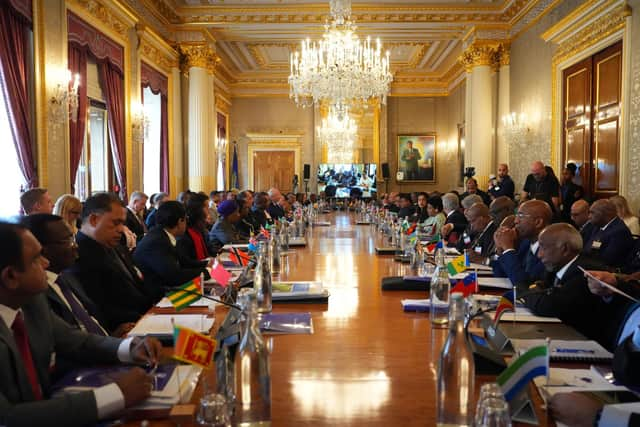Ruth Dudley Edwards: Ireland should join the Commonwealth and ditch neutrality for Nato


We live in a dangerous world. Why does it squander opportunities to make new friends?
Yesterday and today the Commonwealth Trade Ministers are in London discussing how best to boost intra-Commonwealth trade and investment.
Advertisement
Hide AdAdvertisement
Hide AdThere are 56 countries in the organisation — some of them recent arrivals. How could that not be useful?
I feel this most acutely every two years when the Commonwealth Games are held, giving vital experience of international competition to young athletes.
At the 2022 games, Northern Ireland won 18 medals — seven gold, seven silver and four bronze. The Republic could not, of course, participate.
I care about the well-being of my native country, as well as the UK, where I live — which is part of the reason why I've spent so much of my life trying to combat the cancer of physical force nationalism — which after 100 years of independence still threatens the peace of the entire island.
Advertisement
Hide AdAdvertisement
Hide AdThere is no public support for a return to the bad old days but of course those who run Sinn Féin from the shadows still want to destroy Northern Ireland — these days with an army of lawyers rather than terrorists.
I’m no fan of the EU, which I never thought suited the UK, but there's no doubt that it's been good for the Republic — in 1973 an introverted little country on the edge of a continent which was obsessed with its relationship with its next-door neighbour. The EU gave it self-respect, enormous opportunities and a broadening of its horizons.
The Commonwealth could have helped similarly, had the Free State not stupidly largely boycotted it from the early 1930s and then resigned in 1949 when it became a republic. This break was engineered by the Minister for External Affairs, Sean MacBride, an ex-Chief of Staff of the IRA.
Yet other dominions, following the lead of India that year, became republics or constitutional monarchies with their own monarchs but stayed in, with the word British being dropped from the title. It would have an important if undervalued part in managing Britain's imperial decline and in fostering cross-continental friendships between new and old members.
Advertisement
Hide AdAdvertisement
Hide AdThe Queen remained Head of the Commonwealth throughout her life by agreement of its members. This was not bowing the knee to the British monarch. It was a recognition that without her faith in it and her relationship with its innumerable heads of state, the Commonwealth would not have survived. And it was because of Prince Charles’s deep knowledge of the organisation and many of its leaders that he was elected to succeed her. Such institutional memory is an asset beyond price.
For all that they boast about being progressive, Irish nationalists are politically strikingly conservative. We know about their rooted objections to changes to symbols like the flag and national anthem even if the status quo is identified as a serious block to the united island most nationalists claim to want.
Then there’s neutrality, for example, which was adopted for pragmatic reasons during the Second World War (although the government gave discreet assistance to the Allies and 70,000 from the Free State joined the British Armed Forces) and adopted as a convenient article of faith. Ireland saved a fortune by spending next to nothing on defence while hiding behind the skirts of the British Navy and the RAF.
What with the Ukrainian war and Chinese infiltration, intimidation and empire building, enhanced engagement with the Commonwealth makes sense.
Advertisement
Hide AdAdvertisement
Hide AdApart from the ignorant, who don't know how the organisation has changed, and of course, the Anglophobes who are always with us, there is, however, a stumbling block to joining in the shape of the EU. What Brussels wants is for Ireland to toe its line on foreign policy and international relationships.
The Republic is heading for many tricky negotiations with the Commission over such issues as a European army and tax harmonisation. Still confrontational over Brexit, it might take umbrage if Ireland decided to join a multilateral organisation wrongly seen as a rival.
Yet surrendering its sovereignty to unelected bureaucrats is not in Ireland’s interests. The courageous path would be to join both the Commonwealth and Nato.